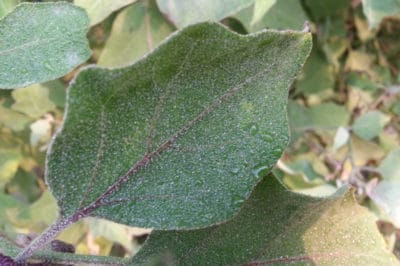What Pests Eat Eggplant Leaves?
Many types of pests can cause damage to your eggplant leaves. The most common pest that infests eggplants is the flea beetle. If you notice multiple, tiny holes on the eggplant foliage, then flea beetles are the cause.
You can control flea beetle infestation organically by planting companion plants that attract flea beetles, keeping them off your eggplants. You can also spread plastic mulch around the base of your eggplants, preventing flea beetles and other insects from coming up through the soil.
The following insects also eat eggplant leaves:
- Aphids
- Cucumber beetles
- Cutworms
- Earwigs
- Snails
- Slugs
- Whiteflies
Why Are Eggplant Leaves Turning Yellow?
Eggplant leaves can turn yellow if they’re not getting enough water, or if the temperature rises above 85°F (29°C). If your eggplant leaves have yellow edges and tips, then the cause is verticillium wilt.
This disease eventually turns the whole leaf yellow, then it spreads to the entire plant. The fungus that causes verticillium wilt lives in the soil, and reappears every year. Planting resistant eggplant varieties can prevent the fungus, or moving your garden to a new location also prevents the disease.
Why Are Eggplant Leaves Curling?
If you notice your eggplant leaves curling, and have blotchy green patches, then one reason could be the cucumber mosaic virus. This virus causes misshapen leaves that have a deformed, curled, shoestring appearance. This disease infects many of the nightshade family plants, causing stunted growth. It does not live in the soil, but aphids spread it to the eggplants. Using organic pest control can help prevent the disease.
Are Eggplant Leaves Edible?
Eggplant fruit is nutritious and flavorful, with only 38 calories in one cup. It’s also a great source of fiber, potassium and iron, but the leaves and stems are another story.
According to the United States Department of Agriculture, eggplant leaves are toxic and narcotic, like many members of the nightshade family, so they are inedible . The alkaline known as solanine is the toxic part of the eggplant leaves and flowers. Solanine causes symptoms, such as nausea, drowsiness, fever, weakness and vomiting.
